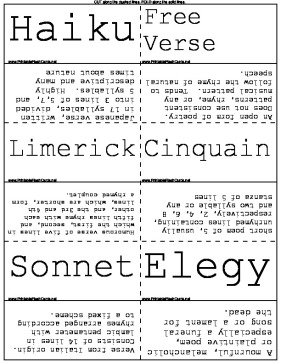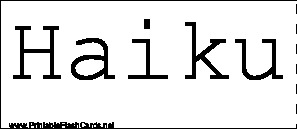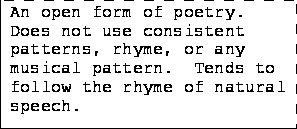

Learn about form and structure in poetry with this literary word search.
There are 11 flash cards in this set (2 pages to print.)
To use:
1. Print out the cards.
2. Cut along the dashed lines.
3. Fold along the solid lines.
Sample flash cards in this set:




| Questions | Answers |
|---|---|
| Haiku | Japanese verse, written in 17 syllables, divided into 3 lines of 5,7, and 5 syllables. Highly descriptive and many times about nature |
| Free Verse | An open form of poetry. Does not use consistent patterns, rhyme, or any musical pattern. Tends to follow the rhyme of natural speech. |
| Limerick | Humorous verse of five lines in which the first, second, and fifth lines rhyme with each other, and the 3rd and 4th lines, which are shorter, form a rhymed couplet. |
| Cinquain | short poem of 5, usually unrhymed lines containing, respectively, 2, 4, 6, 8 and two syllable or any stanza of 5 lines |
| Sonnet | Verse from Italian origin. Consists of 14 lines in lambic pentameter with rhymes arranged according to a fixed scheme. |
| Elegy | A mournful, melancholic or plaintive poem, especially a funeral song or a lament for the dead. |
| Ballad | Retells an event in history, in the news, or in your life. |
| Ode | A formal, often ceremonious lyric poem that addresses and often celebrates a person, place, thing, or idea. |
| Prose | The ordinary form of spoken or written language, without metrical structure, as distinguished from poetry or verse. |
| Quatrain | A four line stanza, rhyming |
| Sestina | A complex French verse form, usually unrhymed, consisting of 6 stanzas of 6 lines each. |